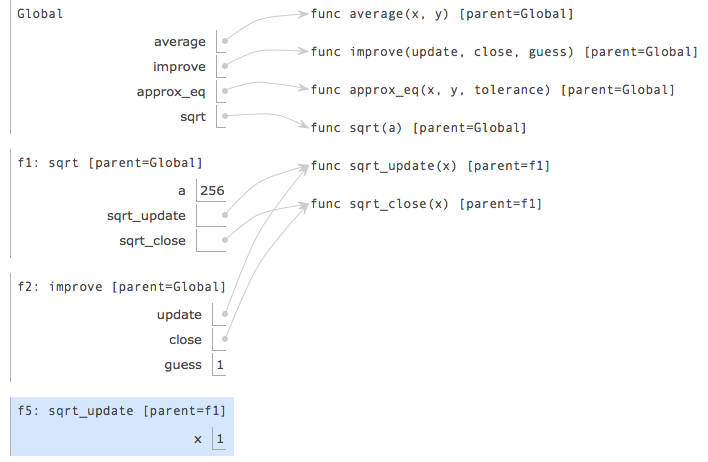BabbleDay's Blog
Happy Coding
Higher-Order Functions in Python
学习资料:
http://composingprograms.com/pages/16-higher-order-functions.html
定义:
Higher-Order functions can accept other functions as arguments or return functions as values.
例一:计算黄金比例
def improve(update, close, guess=1):
while not close(guess):
guess = update(guess)
return guess
def golden_update(guess):
return 1/guess + 1
def square_close_to_successor(guess):
return approx_eq(guess * guess,
guess + 1)
def approx_eq(x, y, tolerance=1e-3):
return abs(x - y) < tolerance
phi = improve(golden_update,
square_close_to_successor)
Two key advantages of lexical scoping in Python.
-
函数命名只与定义环境有关,与执行环境无关
The names of a local function do not interfere with names external to the function in which it is defined, because the local function name will be bound in the current local environment in which it was defined, rather than the global environment.
-
执行函数由内向外延展
A local function can access the environment of the enclosing function, because the body of the local function is evaluated in an environment that extends the evaluation environment in which it was defined.
例二:
def average(x, y):
return (x + y)/2
def improve(update, close, guess=1):
while not close(guess):
guess = update(guess)
return guess
def approx_eq(x, y, tolerance=1e-3):
return abs(x - y) < tolerance
def sqrt(a):
def sqrt_update(x):
return average(x, a/x)
def sqrt_close(x):
return approx_eq(x * x, a)
return improve(sqrt_update, sqrt_close)
result = sqrt(256)
|
 |
函数计算时层层隔离,名字重复无影响。但是对于大工程来说,明明冲突可能给自己带来麻烦,比如需要重命名的时候。
def square(x):
return x * x
def successor(x):
return x + 1
def compose1(f, g):
def h(x):
return f(g(x))
return h
def f(x):
"""Never called."""
return -x
square_successor = compose1(square, successor)
result = square_successor(12)